line drawings with labels to identify common tree shapes
Finding the right tree for your landscape can be difficult. Size is obviously a factor, but have you ever thought about the shape? Whether you're planting trees for privacy or a place to relax in the shade, knowing how a tree will mature is important to achieving the results you desire. To start selecting trees by shape, look at the layout of your property and create a plan.
Choosing a Tree
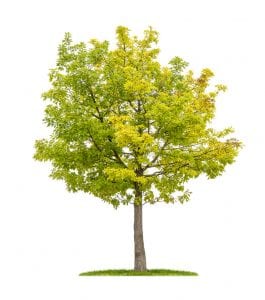 If you're looking for a tree that fits your property, it helps to picture the shape of the tree you'd like. Then you can narrow down your choices by which species of that shape do well in your area. Keep in mind the size of your yard and shape of your house when choosing your next tree.
If you're looking for a tree that fits your property, it helps to picture the shape of the tree you'd like. Then you can narrow down your choices by which species of that shape do well in your area. Keep in mind the size of your yard and shape of your house when choosing your next tree.
The massive size and blocky shape of a gorgeous Red Oak looks great with a tall, relatively narrow home in a large yard. But that same tree will dwarf a single-story home and completely take over an average size yard!
Tree Shapes
There are approximately eight different shapes of trees available:
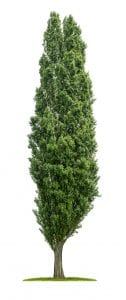 Columnar Trees
Columnar Trees
These trees are shaped just like their name implies – a column. They generally have a single trunk and their branches are of a uniform length and spacing. This gives them their tidy and somewhat formal.
- Examples: Quaking Aspen (Populus tremuloides), Red and Sugar Maples (Acer rubrum and saccharum), Lombardy Poplar (Populus nigra 'Italica')
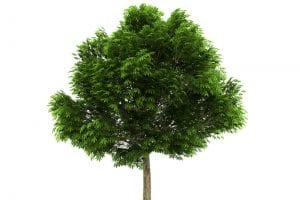 Open-head Irregular Trees
Open-head Irregular Trees
Open-head irregular trees are the opposite of columnar trees. Their irregular, random branching habit creates a tree with an asymmetrical canopy that provides lots of lovely shade in the summer.
- Examples: Buckeye (Aesculus flava), Hickory (Carya species), Pawpaw (Asimina triloba), Silver Maple (Acer saccharinum)
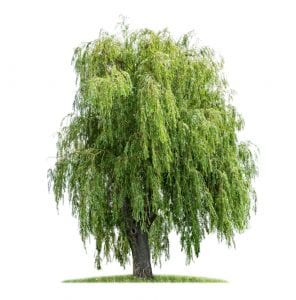 Weeping trees
Weeping trees
Weeping trees have a lovely, graceful, dome shape. They're often ornamental and help soften the look of a yard.
- Examples: Birch (Betula species), Hemlock (Tsuga canadensis), Katsura (Cercidiphyllum japonicum), Black Willow (Salix nigra)
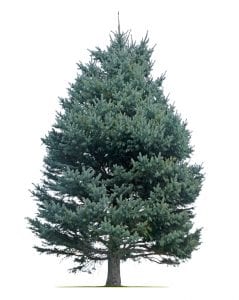 Pyramidal trees
Pyramidal trees
These trees are shaped like (you guessed it) a pyramid. They're broad at the base and narrow at the top. Picture the classic shape of a Christmas tree; although, many deciduous trees are this shape too. They can be stunning if they're planted where that broad base has room to stretch out.
- Examples: American Holly (Ilex opaca), Blue Spruce (Picea pungens), Linden (Tilia species), Pin Oak (Quercus palustris)
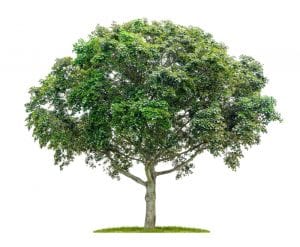 Globe-shaped trees
Globe-shaped trees
Globe-shaped trees are the kind most children draw. They have a very regular, rounded top supported by a clean trunk. Rows of them make a grand and formal entrance while a single tree makes a magnificent focal point to enjoy.
- Examples: Black Maple (Acer nigrum), Flowering Dogwood (Cornus florida), Hackberry (Celtis occidentalis), Redbud (Cercis canadensis)
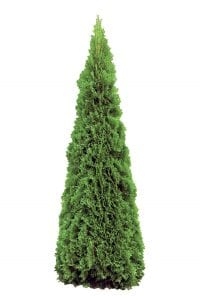 Fastigiate trees
Fastigiate trees
Fastigiate trees carry their upward-sweeping branches close to their multiple trunks. Their tall, narrow, vertical growth habit makes them the perfect tree for privacy screens and sound buffers.
- Examples: Arborvitae (Thuja occidentalis), Ginkgo (Ginkgo biloba), Columnar Eastern White Pine (Pinus strobus 'Fastigiata')
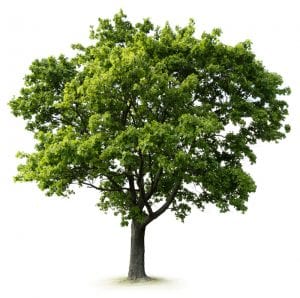 Vase-shaped trees
Vase-shaped trees
These are perfect sidewalk trees since they're the exact opposite of pyramidal trees. Their sharply upward-growing branches don't block the view of traffic or get in the way of pedestrians.
- Examples: Boxelder (Acer negundo), Striped Maple (Acer pensylvanicum)
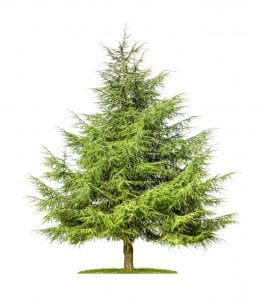 Horizontal spreading trees
Horizontal spreading trees
Horizontal spreading trees are massive and blocky. Their branches are strongly horizontal from the bottom clear to the top. They can overwhelm any but the largest yards just from their sheer bulk.
- Examples: Eastern Red Cedar (Juniperus virginiana), Red and White Oak (Quercus rubra & alba), Witch Hazel (Hamamelis virginiana)
New Jersey-Friendly Trees
All of the trees listed above are proven to do well in New Jersey yards. Don't forget – while shape is important to think about when planting a tree – soil conditions, foliage, and sunlight requirements are important too. If you have questions about choosing the shape of your next tree, contact us. We're passionate about the wide variety of trees growing here in Northern New Jersey and we'll help you find the right tree for your landscape.
Source: https://treesunlimitednj.com/tree-shapes/
0 Response to "line drawings with labels to identify common tree shapes"
Post a Comment